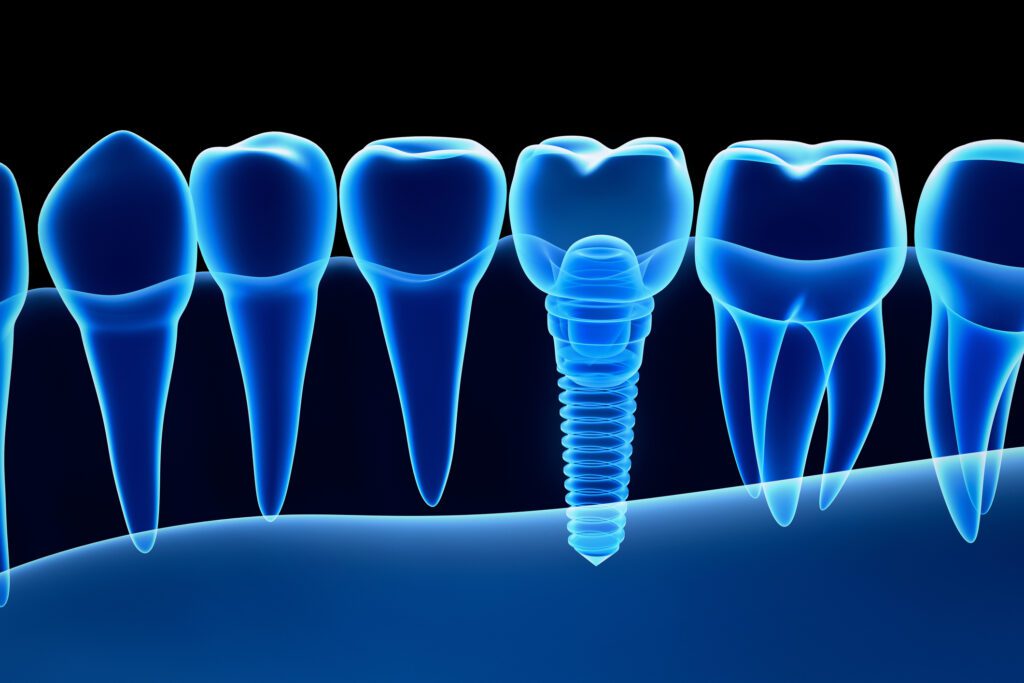It is important to learn about dental implants if you suffer from damaged, diseased, or missing teeth. As the number one suggested replacement for tooth loss, they offer more advantages than any other tooth replacement solution. As an expert implant dentist in Chester Springs, PA, Dr. Jason Petkevis explains what dental implants are to help his patients learn more about them.

The Three Main Parts of a Dental Implant
A dental implant restoration typically consists of three main parts: the implant fixture, the abutment, and the artificial tooth or teeth. These parts are designed to work together to provide a natural-looking and functional smile.
Implant Fixture
An implant fixture is the base of an implant restoration. Dr. Petkevis must surgically put it in place in the jawbone. Most implants are made of titanium or titanium alloy, a biocompatible material. This allows the implant to fuse with the jawbone during osseointegration. Implant fixtures will replace the missing teeth roots and provide a stable foundation for the artificial tooth or teeth. Depending on the extent of your tooth loss, you will need anywhere from one to eight implants per arch.
A large range of dental implants is available in terms of diameters and lengths. Since jaw sizes vary greatly, there must be a wide variety of implant sizes to accommodate varying sizes and shapes of jawbones. The diameter of an implant can range from as small as 3mm to as large as 7mm, while the length can vary from as short as 6mm to as long as 16mm or more. Dr. Petkevis will choose the best size based on where the implants need to go, the quality and quantity of jawbone, and the number of teeth replaced.
Abutment
The abutment is simply the connector piece that attaches to the tops of the implants. It will sit above the gum line and help secure the dental restoration to the implants. The abutments will be custom-made to fit your implants and dental restoration. Many types of abutments serve different purposes. The abutment you need will depend on the type of dental restoration you are getting.
Artificial Tooth or Teeth
The artificial tooth or teeth are simply your new dental restoration. This part is visible and will replace the crown portions of your missing teeth. We will create a dental crown, bridge, or denture that matches the size, shape, and color of your surrounding teeth. Your new smile will be completely natural-looking.
The Types of Dental Implants
There are three types of dental implants available. Endosteal is the most common type that Dr. Petkevis uses today. However, there are also subperiosteal and zygoma implants.
Endosteal Implants
Endosteal implants are the most common type of dental implant today. They are surgically inserted into the patient’s jawbone. Like other types of replacement body parts, most are made of titanium because the human body accepts titanium well.
An endosteal implant looks like a screw with threads since it will screw into the jawbone. Once there, the bone cells will surround the implant and fuse. This creates a strong bond between the bone and the implant. The implant can then act as the missing tooth root and support a dental crown, bridge, or denture.
Subperiosteal implants
Unlike endosteal implants, subperiosteal implants are placed on top of the jawbone, under the gums, instead of in the jawbone. This type of implant comprises a metal framework that custom fits the patient’s jawbone. The framework is surgically placed on the bone. The gums will heal around the framework with posts that extend from the gums. Then, your dentist can secure the denture, dental bridge, or dental crown.
While endosteal implants are for patients with a lot of quality bone, subperiosteal implants are for those who lack sufficient bone mass. Patients who suffer from bone loss due to disease or missing teeth may lack enough bone to support endosteal implants.
Zygoma Implants
Dentists don’t often use zygoma implants. They are for patients who suffer from severe bone loss in the upper jaw. Instead of securing the implant fixtures to the jaw bone (which lacks quantity and quality), the dentist anchors the implants into the cheekbone. Zygoma implants ultimately give some patients the chance to receive implants that otherwise wouldn’t qualify.
- Implant Dentistry Overview
- Dental Implants FAQs
- Dental Implants vs Dentures
- Implant-Supported Crown
- Implant-Supported Bridge
- Full Mouth Dental Implants
To learn more about dental implants and Dr. Petkevis’s services, please call us at 610-904-9274 to book your consultation. You can also schedule dental implants in Chester Springs, PA by filling out our online appointment form.
